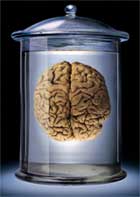The murder conviction of an Iowa man was overturned last year on the basis that the new “brain fingerprinting” technique convinced the court that the “records” in his brain did not match the scene of the crime or the details of the case.
The case and other examples of intrusion into the human brain have stirred the concerns of scientists, including Martha J. Farah, who now directs the University of Pennsylvania’s Center for Cognitive Neuroscience. “For the first time it may be possible to breach the privacy of the human mind, and judge people not only by their actions, but also by their thoughts and predilections,” she says. “The alteration of brain function in normal humans, with the goal of enhancing psychological function, is increasingly feasible and indeed increasingly practiced.”

There is a trend to do for the brain what cosmetic surgery can do for the nose, even though we know a lot more about our noses than we do about our brains.
“Brain-based enhancement involves intervening in a complex and poorly understood system, and the likelihood of unanticipated problems is consequently higher,” she says.
Via ABC News.
